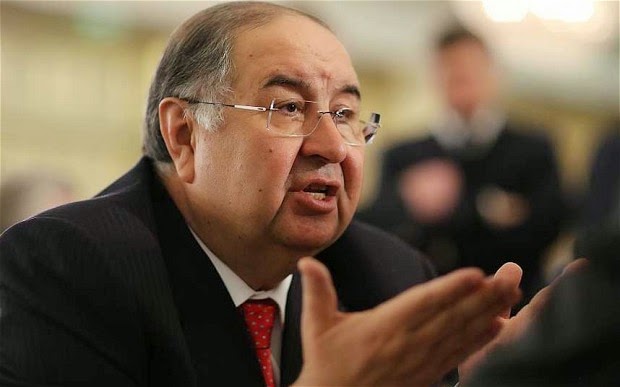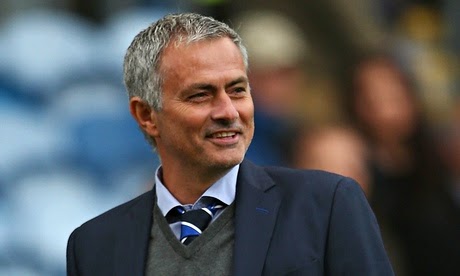EPL: Usmanov says Arsenal is now poise to win trophies
Exclusive interview: Second highest shareholder Alisher Usmanov says Arsenal's nine-year trophy drought could have been averted and he has always been ready to inject funds
Alisher Usmanov has revealed that he has still never spoken to Stan Kroenke since the two billionaires began their battle for control ofArsenal seven years ago but that he believes the club are now finally ready to deliver a new era of trophy-winning success.
In his first newspaper interview about Arsenal since 2011, Usmanov has outlined how the nine-year trophy drought could have been averted, how he has always been ready to inject funds into the club and stressed that he has never had any intention of selling the 30 per cent stake that still makes him the second highest shareholder.
Yet as Arsenal prepare for Sunday’s Community Shield against Manchester City, Usmanov has also delivered his most enthusiastic endorsement of the club’s current direction and is adamant that Arsène Wenger can again win the Premier League title. “The club is very well placed to succeed,” says Usmanov. “I think we begin a new era for Arsenal where we win trophies. That is most important for football. In my opinion, in line with the existing rules, the club has the correct decision-making process in place, including their selection policy, especially now, when they have the means to buy the best players.” Those leading players, of course, include Mesut Özil and Alexis Sanchez, respectively purchased over the past year from Real Madrid and Barcelona for a combined £75 million. The great frustration for Usmanov, however, is that he believes Arsenal could also have maintained a squad full of world-class players over the past decade if the club’s directors had pursued a different strategy.
This was laid bare in an open letter to the board in 2012, just as Arsenal sold their captain Robin van Persie to Manchester United, when Usmanov and business partner Farhad Moshiri outlined their “deep reservations” about the club’s direction. They even warned that Wenger’s minimum target of Champions League qualification was in danger. A central point was that Arsenal had some of the wealthiest shareholders in football at the same time as a restrictive debt that peaked at £318 million following the construction of the Emirates Stadium.
“I think that Arsenal’s planning was based on acquiring the new stadium, a decision taken by the previous owners,” Usmanov says. “The acquisition was financed with debt, which would be repaid through match-day revenues among other sources. There is another way of doing it: when shareholders buy all of the assets and contribute them to the club. As a result, these debt-free assets may generate income for the club. It is always up to the shareholders to choose which model to adopt.
“The board and main shareholders chose the debt option at the time, which led to Arsenal going almost 10 years without winning a domestic title or the Champions League. The first trophy only arrived in the 10th year. As a result of this choice, they were selling players and were unable to buy top players. These difficulties have now been overcome and the team is in a good state; the club’s finances are in order and I believe that Arséne Wenger and the club’s CEO [Ivan Gazidis] will manage them correctly.”
The great ‘what if’ question for Arsenal fans, then, is what might have happened if Usmanov had been chosen by the previous shareholders to own the club? He is, after all, more independently wealthy than Chelsea’s Roman Abramovich and, according to Forbes, also the richest man in Russia. Only last year, he topped the Sunday Times ‘rich-list’ of Britain’s wealthiest residents. So would he have pursued the ‘sugar-daddy’ model of Abramovich or Sheikh Mansour bin Zayed Al Nahyan at Manchester City? Or, when it came down to it, would Usmanov have run Arsenal in a similar way to the more frugal model of self-sustainability?
The answer is that he would have sought to free up funds for Wenger by addressing the stadium debt but that he actually agrees with Uefa’s Financial Fair Play principle of clubs living within their natural means.
“I would do it my way, the way of Alisher Usmanov and not the way of Roman Abramovich or Sheikh Mansour, with all my respect to these two people,” explains Usmanov. “I invested in Arsenal when I bought shares. Obviously, if the club needs it [money], I am ready to consider various options. In my view, at present, the club has great prospects and it does not need additional investment.”
Usmanov has repeatedly suggested a ‘rights issue’ that would allow the debt – which has now fallen to below £100 million – to be paid off by leading shareholders investing additional non-dividend equity into the club. Not only would this have spared Arsenal their capital repayments on the stadium debt but also annual interest charges that were around £20 million. The proposal would have been in line with Uefa’s Financial Fair Play regulations but was rejected by the club’s directors, who preferred ‘self-sustainability’.
This meant no shareholders putting any of their money into the club but still allowed former directors, including the late Danny Fiszman, David Dein, Peter Hill-Wood, Lady Bracewell-Smith and Richard Carr to ultimately sell their stake at massive profits.
At the same time, ticket prices for fans were rising to among the highest in world football. Usmanov agrees that Arsenal are now through that difficult period but says it could have been averted if, like him, the other shareholders had been prepared to effectively fund the building of the Emirates out of their own pockets. He is happy now, though, that Uefa is trying to stop unlimited spending on players and their wages.
“I think that Financial Fair Play is a necessary disciplining measure to limit clubs’ unreasonable spending in the absence of their own youth development infrastructure,” says Usmanov. “I believe this is the right thing to do. In addition, clubs should adhere to the principle of income from core activities, football income and football-related commercial activities. My view is that the main thing in Financial Fair Play is that you invest your own funds in your assets.”
Usmanov’s wider philosophy has been shaped by his own personal experiences and, while he has described Arsenal as first and foremost a “business investment”, his love for sport is undoubtedly authentic. He talks nostalgically about how he played football with his school-mates and then, at the age of 12, was taken by his father from his home in Uzbekistan to Moscow to watch Brazil – with Pele in the team – defeat the USSR 3-0.
Usmanov became an Arsenal fan in the late 1990s because of the style of football and has long been advocating the return of record scorer Thierry Henry in a similar non-playing capacity to Patrick Vieira’s at Manchester City.
Away from football, Usmanov was once a sabre fencer and is the president of the International Fencing Federation. In that capacity, he followed Lord Coe and Ed Moses in being presented a special “For a life in the spirit of Fair Play” award last month by the International Fair Play Committee.
He is adamant that his role at Arsenal has been supportive and constructive. Early in his involvement, Usmanov felt he was treated on the basis of “totally unobjective” opinions by some board members. He had served six years in prison in the Uzbek Soviet Socialist Republic during the 1980s on charges he refutes and describes as “trumped up” – and it was subsequently ruled by the Uzbekistan Supreme Court that the crimes did not take place. Even now, Usmanov’s relationship with Russian president Vladimir Putin is the subject of intrigue but he was not among those Russian oligarchs targeted by European Union or United States sanctions following the crisis in Ukraine. Usmanov has stressed his disinterest in a political career and his numerous business interests, including Arsenal, are in the private sphere.
“I never said anything bad about the club or somebody personally,” he says. “I said what, in my view, we can do – not better – but more effectively. I also want to highlight the contribution of the coaching team. They achieved the best they could at a time when the club had a huge financial deficit.” Usmanov’s appreciation for Wenger – he describes the Frenchman as “a genius” – is well documented but his supportive words for the current directors is perhaps more surprising. Several club insiders, however, confirm an easing of tensions during the past 18 months between Usmanov and the current board, headed by Kroenke. The two men were engaged in a complicated battle for control of Arsenal’s shares since making their first investments in 2007 right up until Fiszman’s death precipitated a mandatory takeover offer from Kroenke that resulted in him taking a majority share in 2011. Usmanov could then have sold his stake to Kroenke – he would have still profited handsomely – but he instead made a counter offer to Bracewell-Smith that would have blocked Kroenke’s takeover. Had Usmanov succeeded – and Lady Bracewell-Smith has since suggested that she may have made a mistake – he would have had more than 43 per cent of the shares against Kroenke’s total of almost 47 per cent. The preferences of smaller shareholders would then have decided the ownership structure of Arsenal. As it is, Usmanov has been left unable to significantly increase his stake beyond 30 per cent and, despite investing more than £200 million in Arsenal, without any day-to-day input on the club’s decision-making.
Despite that he has never asked for a seat on the board and is actually appreciative of how the club have supported some of his charitable work that has allowed Russian orphans to meet Wenger and the players. Usmanov is granted access and a table in the directors’ lounge at matches and, with friends, family and business partners, rarely misses a game. What once seemed like a dysfunctional relationship is steadily improving. Both Usmanov and Kroenke are adamant that their investment is long term and, on both sides, every indication is that their Arsenal shares will remain in their respective families for another generation.
“I have warm and, in my view, good relationships with a number of the board members,” says Usmanov. But has there ever been any direct dialogue with Kroenke? “I have not had any contact with Mr Kroenke,” he says. “Those who control the club run the club. Mr Kroenke’s group controls the club and they control the day-to-day management. I hold a 30 per cent stake in Arsenal and therefore, the board’s success is shareholders’ success.” But is Usmanov still as committed as ever to his Arsenal investment? “Yes,” he says. “I have no plans to exit. I wish Arsenal success and hope that they win trophies.”


